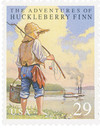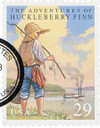
# 2787 - 1993 29c Classic Books: The Adventures of Huckleberry Finn
U.S. #2787
1993 The Adventures of Huckleberry Finn – Classic Books
- Honors beloved children’s book The Adventures of Huckleberry Finn, a literary classic read by countless Americans
- One of four stamps in the Classic Books set
- Issued during the annual conference of Literary Volunteers of America, Inc. in Louisville, Kentucky
Stamp Category: Commemorative
Set: Classic Books
Value: 29¢, First Class Mail Rate
First Day of Issue: October 23, 1993
First Day City: Louisville, Kentucky
Quantity Issued: 150,200,000
Printed by: American Bank Note Company (6-color Miller offset sheetfed press and 3-color Giori Simplex intaglio sheetfed press)
Printing Method: Offset, Intaglio
Format: Panes of 40 (vertical 8 across, 5 down)
Perforations: 11 x 11.1 (Bickel reciprocating stroke perforator)
Tagging: Prephosphored paper and block tagging applied over Little Women and Rebecca of Sunnybrook Farm stamps
Why the stamp was issued: To honor a popular children’s book – The Adventures of Huckleberry Finn – that has become a literary classic in the United States.
About the stamp design: The design pictures Huckleberry Finn facing to the right away from the viewer with a wooden pail in one hand and a fishing pole over his shoulder. In the background is a steamboat heading toward a bend in the Mississippi River.
Special design details: The Little House on the Prairie stamp design is a near-mirror image of The Adventures of Huckleberry Finn design – the figures are facing in opposite directions with their backs to the viewer and are both carrying wooden pails.
First Day City: The Classic Books stamps were issued in Louisville, Kentucky, to coincide with the annual conference of Literacy Volunteers of America, Inc.
About the Classic Books set: The Classic Books stamps were created using artwork by Jim Lamb of Issaquah, Washington, with input by art director Richard Sheaff. The artwork pictured on the stamps was created using acrylic, with the posing of the figures referenced from photographs of Lamb’s family and friends in costumes. Lamb altered everyone’s faces to avoid the controversy of picturing living people on stamps. “What I was after was the poses and the way the fabric lies and the way the light strikes the subject,” he said. “When you’re doing a painting you like to have access to that kind of information, to bring a little more credibility, a little more reality to it.” Lamb skimmed each of the books to be represented on the stamps to get an idea of what images might be best. “In no case did I try to paint a specific scene from any of the novels. My whole idea was just to kind of capture the feel of the book rather than anything specific.”
The selvage of the panes reads “These stamps honor four/classic books enjoyed by/’youngsters of all ages.’” “Mark Twain’s (Samuel/L. Clemens) classic novel/ Huckleberry Finn was/first published in 1884.” “Louisa May Alcott’s/enduring two-volume/Little Women was first/published in 1868 &/1869.” “Kate Douglas Wiggin’s/long-popular Rebecca of/Sunnybrook Farm was/first published in 1903.” “Laura Ingalls Wilder’s/popular Little House on/the Prairie was first/published in 1932.”
When the USPS pre-released the four stamp designs to the public in October 1992, some of their feedback led to adjustments to the original artwork. The Little Women design was altered to make the oldest sister appear younger as audiences mistook her for Mrs. March rather than one of the sisters (Lamb gave the figure a braid instead of a bun and softened her features). The letter on the oldest sister’s lap was also changed from having a ragged, torn top to a smooth one.
The Huckleberry Finn design was also changed to make the steamboat a sidewheel model rather than the original sternwheeler that was pictured (this made the boat more historically accurate to the time period the novel was set in). Lamb also took out some of the white flowers at Huck’s feet to improve the legibility of the “USA.”
History the stamp represents: Based on his childhood experiences along the Mississippi River, Mark Twain’s Adventures of Huckleberry Finn provides a vivid record of 19th century America. Begun in 1876 as a sequel to The Adventures of Tom Sawyer, the book describes the adventures of two runaways – the boy Huckleberry Finn and a slave named Jim – as they travel on a raft down the Mississippi.
Told from Huckleberry Finn’s point of view, Twain used realistic language to make Huck’s speech sound like actual conversation, and imitated a variety of dialects to bring the other characters to life. It was this realistic use of speech that set Twain’s work apart from other writers of the day and influenced numerous other modern American authors. “All modern American literature comes from… Huckleberry Finn,” Ernest Hemingway once stated.
Considered by many to be one of the greatest American novels ever written, the book is not without its foes. As when it was first published in 1885, Huckleberry Finn still receives criticism for Huck’s lack of morals, as well as his unrefined manners and careless grammar. Its deeper themes, however, argue for equality and universal opportunities for all races.
U.S. #2787
1993 The Adventures of Huckleberry Finn – Classic Books
- Honors beloved children’s book The Adventures of Huckleberry Finn, a literary classic read by countless Americans
- One of four stamps in the Classic Books set
- Issued during the annual conference of Literary Volunteers of America, Inc. in Louisville, Kentucky
Stamp Category: Commemorative
Set: Classic Books
Value: 29¢, First Class Mail Rate
First Day of Issue: October 23, 1993
First Day City: Louisville, Kentucky
Quantity Issued: 150,200,000
Printed by: American Bank Note Company (6-color Miller offset sheetfed press and 3-color Giori Simplex intaglio sheetfed press)
Printing Method: Offset, Intaglio
Format: Panes of 40 (vertical 8 across, 5 down)
Perforations: 11 x 11.1 (Bickel reciprocating stroke perforator)
Tagging: Prephosphored paper and block tagging applied over Little Women and Rebecca of Sunnybrook Farm stamps
Why the stamp was issued: To honor a popular children’s book – The Adventures of Huckleberry Finn – that has become a literary classic in the United States.
About the stamp design: The design pictures Huckleberry Finn facing to the right away from the viewer with a wooden pail in one hand and a fishing pole over his shoulder. In the background is a steamboat heading toward a bend in the Mississippi River.
Special design details: The Little House on the Prairie stamp design is a near-mirror image of The Adventures of Huckleberry Finn design – the figures are facing in opposite directions with their backs to the viewer and are both carrying wooden pails.
First Day City: The Classic Books stamps were issued in Louisville, Kentucky, to coincide with the annual conference of Literacy Volunteers of America, Inc.
About the Classic Books set: The Classic Books stamps were created using artwork by Jim Lamb of Issaquah, Washington, with input by art director Richard Sheaff. The artwork pictured on the stamps was created using acrylic, with the posing of the figures referenced from photographs of Lamb’s family and friends in costumes. Lamb altered everyone’s faces to avoid the controversy of picturing living people on stamps. “What I was after was the poses and the way the fabric lies and the way the light strikes the subject,” he said. “When you’re doing a painting you like to have access to that kind of information, to bring a little more credibility, a little more reality to it.” Lamb skimmed each of the books to be represented on the stamps to get an idea of what images might be best. “In no case did I try to paint a specific scene from any of the novels. My whole idea was just to kind of capture the feel of the book rather than anything specific.”
The selvage of the panes reads “These stamps honor four/classic books enjoyed by/’youngsters of all ages.’” “Mark Twain’s (Samuel/L. Clemens) classic novel/ Huckleberry Finn was/first published in 1884.” “Louisa May Alcott’s/enduring two-volume/Little Women was first/published in 1868 &/1869.” “Kate Douglas Wiggin’s/long-popular Rebecca of/Sunnybrook Farm was/first published in 1903.” “Laura Ingalls Wilder’s/popular Little House on/the Prairie was first/published in 1932.”
When the USPS pre-released the four stamp designs to the public in October 1992, some of their feedback led to adjustments to the original artwork. The Little Women design was altered to make the oldest sister appear younger as audiences mistook her for Mrs. March rather than one of the sisters (Lamb gave the figure a braid instead of a bun and softened her features). The letter on the oldest sister’s lap was also changed from having a ragged, torn top to a smooth one.
The Huckleberry Finn design was also changed to make the steamboat a sidewheel model rather than the original sternwheeler that was pictured (this made the boat more historically accurate to the time period the novel was set in). Lamb also took out some of the white flowers at Huck’s feet to improve the legibility of the “USA.”
History the stamp represents: Based on his childhood experiences along the Mississippi River, Mark Twain’s Adventures of Huckleberry Finn provides a vivid record of 19th century America. Begun in 1876 as a sequel to The Adventures of Tom Sawyer, the book describes the adventures of two runaways – the boy Huckleberry Finn and a slave named Jim – as they travel on a raft down the Mississippi.
Told from Huckleberry Finn’s point of view, Twain used realistic language to make Huck’s speech sound like actual conversation, and imitated a variety of dialects to bring the other characters to life. It was this realistic use of speech that set Twain’s work apart from other writers of the day and influenced numerous other modern American authors. “All modern American literature comes from… Huckleberry Finn,” Ernest Hemingway once stated.
Considered by many to be one of the greatest American novels ever written, the book is not without its foes. As when it was first published in 1885, Huckleberry Finn still receives criticism for Huck’s lack of morals, as well as his unrefined manners and careless grammar. Its deeper themes, however, argue for equality and universal opportunities for all races.













